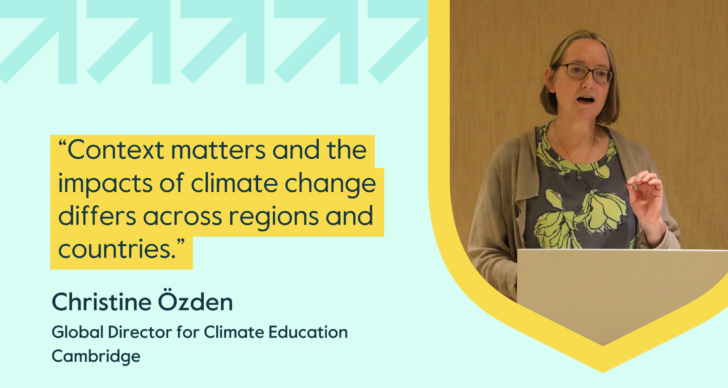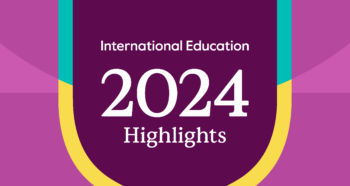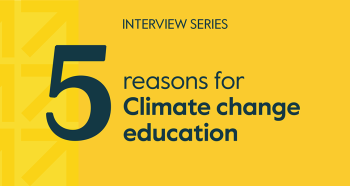As 2024 draws to a close, we asked Cambridge’s Global Director for Climate Education, Christine Özden, to reflect on the progress made in climate change education this year, and share her insights from the recent UN conferences on climate change (COP29) and land degradation and desertification (COP16).
Empowering change through education
‘High-quality climate change education empowers individuals to understand the root causes and consequences of climate change, fostering shifts in behaviour and attitudes toward more sustainable lifestyles. It not only transforms those receiving the education but also influences the families and communities around them’, says Christine.
Since her appointment as Global Director for Climate Education at Cambridge in 2022, Christine’s work has focused on promoting the crucial role that education plays in tackling the climate crisis. As part of this, we published an introduction paper earlier this year, Empowering learners through climate change education.
As we continue to see some of the profound impacts of climate change: drought, floodings, heatwaves and extreme temperatures, Christine says climate change education can drive stronger awareness and action.
‘Educating learners to tackle and thrive through complex challenges starts with establishing foundational scientific knowledge, fostering critical and evaluative thinking, and challenging unsustainable ways of thinking.’
At the same time, she also calls for schools to consider eco-anxiety when teaching about climate change, acknowledging the emotional impact that learning about the climate crisis can have on students.
‘High-quality climate change education must also have the space to address climate or eco-anxiety and encourage learners to share their feelings about climate change and process their emotions.’
One way to address and alleviate eco-anxiety Christine says, is to help learners with the small practical steps they can take within classrooms and the wider community.
Did education receive the recognition it deserves at the UN’s latest COP conferences?
COP29 in Azerbaijan (11-22 November) was described as the “Finance COP”. Negotiations centred on the financial support that high-income countries should donate to low- and middle-income countries to help combat the effects of climate change on the latter. As well as the strong focus on finance, Christine says that one of the days of the conference focused on education and other interconnected themes such as human development, children and youth.
Education featured as key content in the Baku Guiding Principles on Human Development for Climate Resilience, which were launched at the conference. In the declaration, the third guiding principle calls for ‘investing in integrating quality climate change education at all levels and regularly assessing student competencies to address climate change.’
The fourth principle calls for ‘building climate-resilient and low-carbon education systems’, while principle five aims to ‘scale up the creation of decent green jobs by equipping workers, including women and youth, with the necessary knowledge and skills through targeted skilling, reskilling, and upskilling.’
Christine tells us that COP16 in Saudi Arabia (held from 2-13 December) focused on sustainable land management, however the significance of education was still embedded into broader discussions. At the conference, Christine took part in panel discussions on People’s Day and Governance Day, where alongside other panellists, she explored how education enables the delivery and achievement of important action on climate change. The special importance of girls’ education formed part of this discussion, as research shows that women and girls are disproportionately impacted by climate change. Ensuring girls participate in education will empower them to drive forward solutions.
Partnerships for Climate Success at COP29: Cambridge and ICESCO
ICESCO (the Islamic World Educational, Scientific and Cultural Organization) is an intergovernmental organisation specialising in education, science, and culture, with 53 member states across the Muslim world.
We share the belief with ICESCO that education plays an important role in building a more sustainable future, with a strong focus on equity and inclusion. Therefore, at COP29, Cambridge and ICESCO hosted a joint panel chaired by Christine and Dr Haddy Jatou Sey, Head of the Education Sector at ICESCO and Former Minister of Education in The Gambia.
During the session, Cambridge and ICESCO successfully launched the ‘Greening Education for Policy Makers framework, which outlines nine key recommendations across curriculums, schools, communities, and teachers.
‘We’ve seen first-hand how partnerships blend local insights with a global perspective on education system development and evidence, leading to more effective and impactful solutions,’ says Christine. ‘Our experience, and indeed evidence, is that leadership commitment to “greening education” is crucial to enable change at speed and at scale across institutions’.
How do we bridge the climate finance gap for education?
At COP29, world leaders pledged $300 billion a year by 2025 to help low- and middle-income countries tackle climate change. However, despite its importance, education continues to receive very little of that climate finance.
‘A recent World Bank report revealed that only 1.5% of global climate funding was allocated to the education sector in 2021’, says Christine.
‘The climate finance gap can be attributed to several factors: a lack of understanding of the critical role education can play, difficulties in accessing climate funds, and challenges in measuring the effectiveness of education, particularly in the short term. Unfortunately, this means education can lose out to other areas where it is simpler and quicker to provide evidence of effectiveness.’
To address this lack of climate funding in education, Christine calls for deeper collaboration and dialogue across sectors and says the integration of high-quality climate change education into curricula will help evidence the benefits of education in tackling the climate crisis.
What’s next for Cambridge?
To understand how much climate change education learners receive in schools, we surveyed more than 300 Cambridge students across the world, and over 75% of them voted for more opportunities to learn about climate change in their classrooms.
‘I was pleased to see so many students asking for this future-focussed education approach. However, I am aware that there is a diversity of views and emotions around climate change amongst young people, and I would like us at Cambridge to engage with the variety of views and understand how we can make climate change in our curricula relevant, engaging, and authentic.’
We continue to work with experts, including those from the University of Cambridge, to reframe our curricula and appropriately address climate change and sustainability-related issues and opportunities. Through this collaboration, we redeveloped our Cambridge IGCSE and Cambridge O Level subjects, Environmental Management, Business, Accounting, and Economics, which now contain more explicit climate change knowledge. Our ambition is to have a multidisciplinary approach and embed climate change at every stage of the Cambridge Pathway, in a range of subjects.
We have also been building and engaging with our climate change education community of school leaders and teachers to share thinking and experiences with and from school leaders around the world. Through listening and collaborating with that community, we produced a new Getting Started with Climate Change guide, designed to support schools as they implement climate change education.
Finally, this December, we added a second paper to our series of climate publications, Empowering engineers of the future through climate change education, pointing to the need to consider the role of engineering teaching and learning in working towards a more sustainable future.
The paper was co-developed with experts from the University of Cambridge’s climate change initiative, Cambridge Zero, and contains practical tips and lesson activities for teachers to explore in the classroom. ‘The University of Cambridge is a global leader for the study of Engineering at Higher Education level. And so we know we have a unique opportunity to make this expertise more available to schools through curriculum content and pedagogy,’ says Christine.
Some of the recommendations from the paper on teaching and learning engineering include:
- Increased focus on building critical thinking skills – which help develop the problem-solving and design thinking capabilities needed for engineering
- Engaging students with real-world problems – through case studies and open access digital tools – to develop multidisciplinary and systems thinking skills
- Providing opportunities for hands-on experiential learning – which gives learners space to be creative and the ability to connect theory with practice
Looking ahead to 2025, we will continue our work to put education at the centre of climate change discussions – raising awareness of its crucial role in tackling the climate crisis and helping us transition to a more sustainable future.





